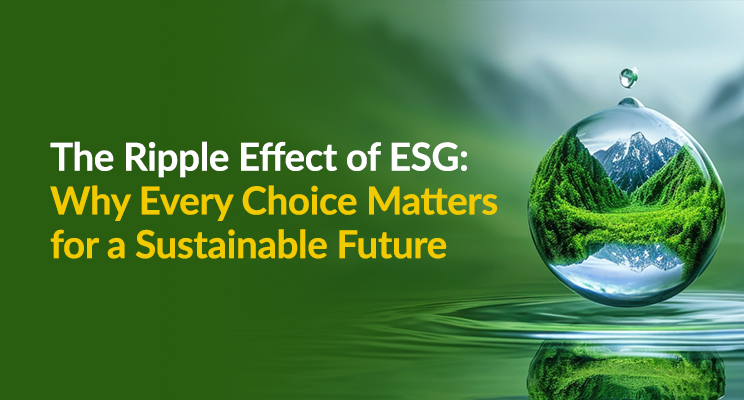In today’s interconnected landscape, every decision we make—whether as individuals, businesses, or governments—ripples out into the broader fabric of society. These choices, large and small, collectively shape our future. When it comes to sustainability, one framework stands out: Environmental, Social, and Governance (ESG). It’s a powerful movement that reflects our collective responsibility toward people, the planet, and prosperity. In this blog, we’ll explore how ESG creates a ripple effect, and why every choice matters for a sustainable future.
Understanding ESG: More Than a Corporate Mandate
Before diving into the ripple effect, it’s essential to understand what ESG encompasses:
Environmental: This pillar focuses on how businesses and individuals impact the environment. Key aspects include carbon emissions, energy efficiency, water management, and resource conservation. For example, companies like Patagonia and REI have made significant strides in reducing their environmental footprint by using sustainable materials, reducing waste, and promoting eco-friendly practices.
Social: The social component emphasizes human welfare, covering topics such as Labor rights, diversity, equity, inclusion (DEI), and community engagement. Companies like Microsoft and Google have implemented robust DEI initiatives, including diversity training Programs, mentorship opportunities, and community outreach initiatives.
Governance: Governance refers to ethical leadership, transparency, accountability, and compliance with laws and regulations. It ensures that organizations operate responsibly, with fair decision-making and integrity. For instance, companies like Unilever and Nestle have implemented robust governance structures, including independent boards, transparent reporting, and whistleblower policies.
Together, these three pillars form a framework that encourages us to think holistically about sustainability.
The Ripple Effect: How Every Choice Matters
ESG is not just a top-down strategy for corporations; it’s a dynamic force where every choice—whether at the boardroom level or by an everyday consumer—creates a ripple. Let’s look at how individual and business decisions generate a widespread impact:
1. Sustainable Products and Consumer Choices
When you buy a product labeled as sustainable, you’re not just purchasing an item—you’re endorsing a company’s commitment to ethical sourcing, environmental responsibility, and fair Labor practices. Consumers today wield immense power, and their preference for sustainable products pushes companies to adopt eco-friendly practices. For example, the demand for sustainable fashion has led companies like H&M and Zara to launch sustainable clothing lines, reducing waste and promoting recycling.
Ripple Effect: Companies respond to consumer demand by shifting their supply chains, reducing waste, and investing in renewable energy, creating a wider societal shift toward sustainability.
2. Business Operations and Supply Chain Transparency
Corporations are increasingly scrutinized on how they manage their supply chains. Ethical sourcing, reducing environmental footprints, and promoting fair Labor practices can transform industries. For instance, companies like Apple and Samsung have implemented robust supply chain transparency initiatives, including audits, reporting, and remediation Programs.
Ripple Effect: When one company improves its supply chain transparency, it pressures competitors to follow suit, raising the standard across entire industries and encouraging regulatory changes that benefit the environment and workers globally.
3. Workplace Culture and Social Responsibility
Social responsibility is no longer confined to philanthropy; it extends to creating equitable, diverse, and inclusive workplaces. When businesses prioritize DEI, they foster innovation, improve employee satisfaction, and enhance their public image. Companies like Salesforce and Airbnb have implemented robust DEI initiatives, including diversity training Programs, mentorship opportunities, and community outreach initiatives.
Ripple Effect: Inclusive corporate cultures inspire other organizations to adopt similar policies, leading to broader social change. This not only improves workplace conditions but also reflects positively on society as a whole.
4. Energy Use and Environmental Impact
For both businesses and individuals, the energy sources we choose have significant environmental consequences. Opting for renewable energy, reducing waste, and improving energy efficiency are pivotal steps in mitigating climate change. Companies like Amazon and Google have made significant investments in renewable energy, including wind farms and solar panels.
Ripple Effect: As more individuals and businesses transition to green energy, the demand for fossil fuels decreases, incentivizing further investments in renewable energy infrastructure. This accelerates the global shift towards a low-carbon economy.
5. Investment Decisions
Investors today are more conscious of ESG factors when allocating capital. Sustainable investing is on the rise, where people choose to invest in companies that prioritize ESG principles. For example, companies like BlackRock and Vanguard have launched sustainable investment funds, promoting ESG-friendly investing.
Ripple Effect: This creates financial pressure on companies to align their operations with ESG goals, which in turn influences their business practices. Ethical investments reshape industries, pushing sustainability to the forefront of corporate agendas.
The Role of Individuals: How You Can Create Ripples
While businesses and governments play a significant role in ESG, individuals also hold the power to make a difference. Every personal decision—from reducing energy consumption to supporting ethical brands—contributes to a broader cultural shift toward sustainability. Here are simple ways you can participate in the ESG movement:
Reduce your carbon footprint: Use energy-efficient appliances, switch to renewable energy sources, and reduce waste at home.
Support ethical companies: Research brands that prioritize sustainability, fair Labor practices, and ethical governance.
Advocate for change: Use your voice to promote ESG-friendly policies in your community or workplace.
The beauty of the ESG framework lies in its collective approach. No single entity or individual can address the complex challenges of climate change, inequality, or corporate ethics alone. However, every choice contributes to a global movement where individuals, businesses, and governments work together for a more sustainable future.
When we embrace the ESG mindset, we understand that every decision we make has a ripple effect—spreading from our local communities to the global stage. Whether it’s through the products we buy, the companies we invest in, or the policies we advocate for, we all play a part in shaping a sustainable future.


